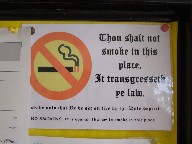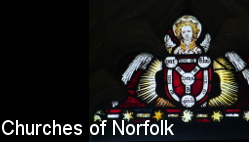| |
|
St Mary,
Hellesdon, Norwich
 |
|
The
historic parish church of Hellesdon is away from
the vast, familiar Hellesdon housing estate on
the other side of the Drayton Road. It is in the
settlement of Lower Hellesdon beyond the former
Hellesdon Hospital, which preserves something of
its former rural character despite its proximity
to both the Hellesdon estate and modern
Costessey. I first came here on a pleasant early
summer day in 2010. I parked my bike in the porch
and went for a tour of the outside of the
building. Sam Mortlock describes St Mary as small
but tall for its size, which is exactly right.
The leaded spirelet sits above the western end of
the nave, and the two-storey vaulted 14th Century
porch seems even larger than it would against a
squatter church. The chantry chapel built on in
the 14th century to the north side of the elegant
chancel is a curious structure which does not
marry well with the rest of the building. I went back
into the porch, and tried the door. Locked. A
sign on the notice board declared thou shalt
not smoke in this place, it transgresseth ye law.
Unfortunately, there wasn't a matching sign
reading thou art thoroughly welcome to enter
into this place or even one that said the
key resteth across the road and thou mayest pick
it up there at thy pleasure. This was a
pity, and, although the humour of the sign did
make me think that the natives might be friendly,
the door remained resolutely locked. There was no
suggestion that pilgrims and strangers might be
able to take a look inside. There was an address
for the Vicar, but he was back at Hellesdon St
Paul a couple of miles off, and as I was on my
bike with plans to visit Costessey's churches
next, I resisted the temptation.
|
It would
be a couple of years before I returned here, again in
early summer. Again, there was no keyholder notice, and
even the number and address for the Vicar in Hellesdon St
Paul had gone. There were the
names of two churchwardens on a notice, but not an
address or phone number. No other notices at all with
contacts on, not in the porch, not on the board by the
gate. And then I spotted a leaflet lying on the bench for
the Hellesdon knitting circle, or some such. I noticed
that the surname of the person to contact was the same as
that of one of the churchwardens - and there was a phone
number. So I rang her up. As it turned out, she was just
going out for the day, and couldn't come to let me in.
"The church is open next Wednesday, though",
she added hopefully.
The following week was the Norwich
Diocese's Open Churches week, so I took it that Wednesday
was their single contribution. "I won't be in
Norwich next Wednesday, I'm afraid," I said. "I
don't suppose that there is anyone else who might be able
to let me in today?"
"Well, there's Brian, he used to be a churchwarden
and he might still have a key." So she gave me
Brian's number, and I rang it, and Brian couldn't have
been nicer. "I'll be there in seven minutes" he
said, with curious precision.
And he was. We stepped into a well-kept although
inevitably somewhat austere interior, given the
narrowness and height, and the rigor of the late 19th
Century restoration. The east window is one of AL
Wilkinson's less inspired efforts, a hasty replacement in
1947 of bomb damage. There is an image niche which looks
rather out of place beside the chancel arch. It is
weathered, and Brian told me that its dimensions exactly
fit the space outside where the low side window is. There
are two simple figure brasses, one remounted in the north
aisle, and the modern fretwork relief of the church's
patron on the organ screen is noteworthy. There is a
memorial to one of the Bullard brewing family.
However, if you had any doubt that
there was life in this church, you have only to step
through the former north doorway into a superb new
extension. Bravely, the former exterior wall and
buttresses have been left unplastered, making a striking
contrast with the new space. It is used by the church as
well as by local community groups.
| Outside,
we wandered in the sunshine and found a couple of
curiosities. One is a 1930s asymmetrical Art Deco
headstone in marble featuring an elegant
windmill. The other is a great oddity, an 1888
pressed galvanised iron gravemarker in a wrought
iron frame. It is to Maria and Stephen Whitewood,
and it is dated simply 1888. According to the
register of Births, Marriages and Deaths, Maria
Whitewood died in Norwich in 1888 at the age of
84. A Stephen Whitewood had died in Norwich at
the age of 87 some 11 years earlier. They don't
appear to be on the 1871 census. They were
probably husband and wife, but if so then their
marriage appears to have been before universal
civil registration began. Hellesdon
is one of two places often referenced as the site
of the martyrdom of St Edmund in the 9th Century.
The other is Hoxne in Suffolk. The choice is
according to the county to which you owe
allegiance, of course. As an adopted son of
Suffolk, I fear I cannot encourage you to take
Hellesdon's claim seriously.
|
|
 |
|
|
|
